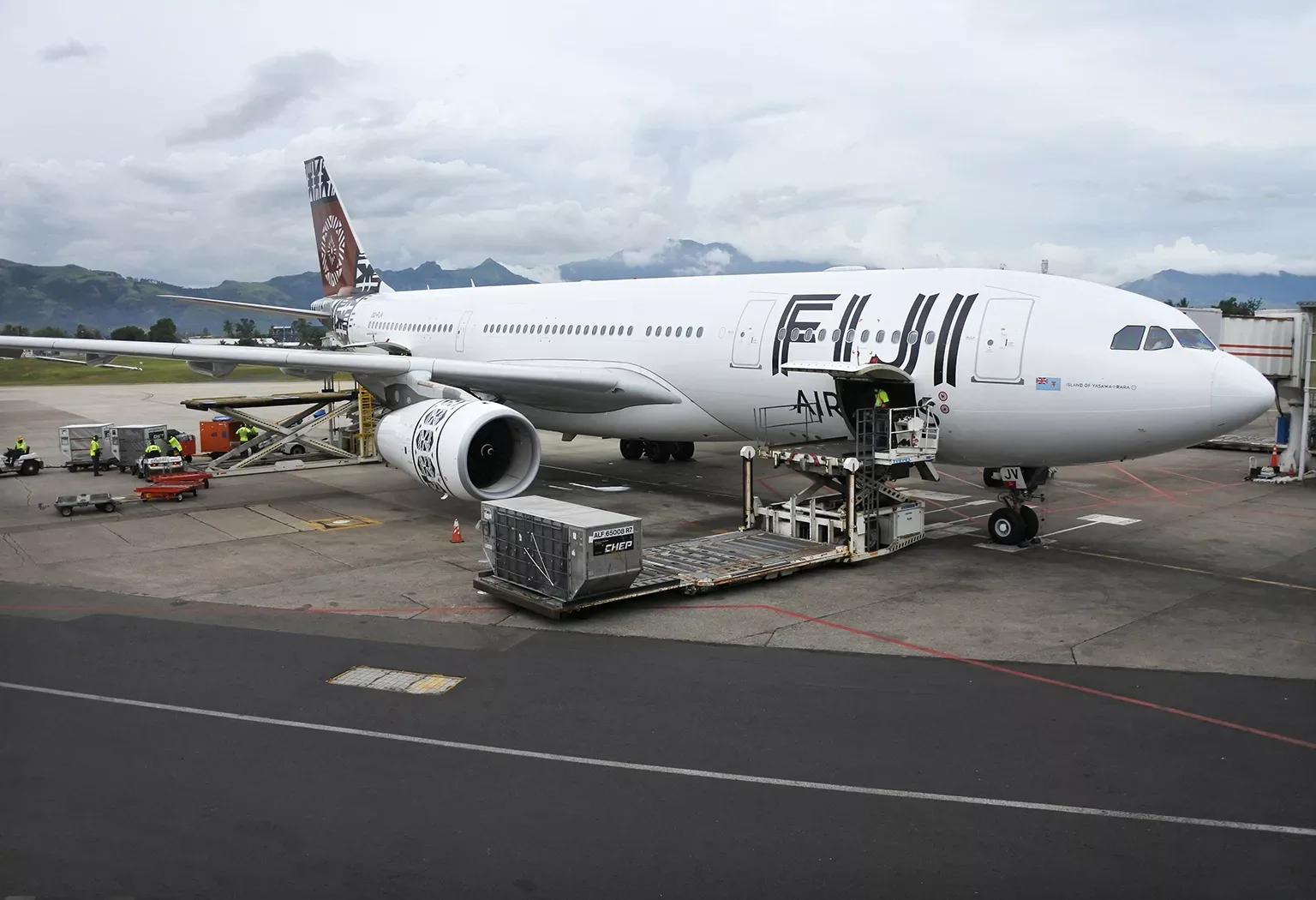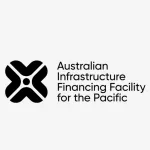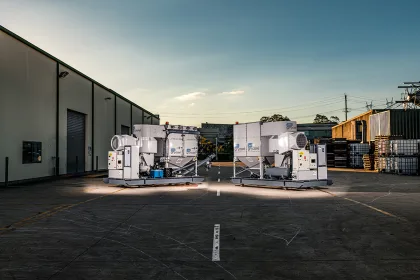Owner of the world-renowned Nadi International Airport, Fiji Airports has been experiencing continuous growth, thanks to the proactive modernisation of its 15 airports and the welcoming of a new CEO, Mesake Nawari.
FIRST CLASS AVIATION MANAGEMENT
In correlation with the wider global landscape at the time, the Fijian aviation industry suffered detrimental effects at the hands of the COVID-19 pandemic, causing a stagnation in international travel and trade.
However, the nation’s industry has reached a turning point in recent years, with the re-opening of the global trade market, and the reclamation of Fiji’s status as a top tourist destination.
“The aviation industry is at an exciting juncture with the resurgence of air traffic post-COVID-19,” opens Mesake Nawari, the newly-appointed CEO of Fiji Airports (FA), who has been taking full advantage of the industry-wide uptake in business.
As a fully owned, government commercial company, established in April 1999, FA has been diligently serving Fiji’s domestic and international airline for over 25 years, having transformed the country’s aviation industry and tourism and trade sectors as a result.
As a conscientious government body, the company has a responsibility to maintain Fiji’s airport system. This is achieved by a comprehensive, in-house dual reporting system that reports to the Minister for Public Enterprises for FA’s commercial performance and the Minister of Civil Aviation on policies relating to the wider industry.
Comprising approximately 450 staff, the company operates 15 airports across the archipelago on behalf of the government, including both Nadi and Nausori International Airports, alongside 13 other domestic sites.
FA provides holistic services to both the supply chain and tourism sectors, comprising operational, technical, commercial, and administrative departments.
Following recent industry trends in aviation, the company endeavours to retain its human capital with a high outflow of skilled workers to overseas markets.
“FA’s key focus is operating the airspace and airports in accordance with International Civil Aviation Organisation (ICAO) standards and recommended practices,” Nawari highlights.
Fiji’s collection of airports has meant that the country has been internationally regarded as a leader in the global aviation industry, as well as becoming a national icon for Fiji. Consequently, the company takes great pride in connecting the country’s tourists and nationals to each other, and the world.
In particular, Nadi International Airport welcomes 97 percent of international travellers to Fiji, of which 80 percent are tourists, Moreover, the airport handles more than 2.1 million international passengers and close to 300,000 domestic passengers annually.
Regarding wider trade, the airport also oversees more than 1.3 million tonnes of freight, services 20 airlines, and connects the country to 15 cities across the globe.
“The aviation industry is at an exciting juncture with the resurgence of air traffic post COVID-19”
Mesake Nawari, CEO, Fiji Airports

MAXIMISING CAPABILITIES
The recent increase in air traffic over the last 18 months has highlighted FA’s need for modernisation, in order to meet the ever-increasing demand.
“Our airports are having to deal with capacity issues and aging infrastructure that is in need of replacement if we are to keep up with the influx of arriving and transit passengers,” Nawari tells us.
To rectify this issue, as well as meet forecasted growth in the coming decades, the company is currently focusing on the revamp of its existing sites through a mix of short-term and long-term strategies including investment in state-of-the-art infrastructure.
“FA has embarked on a capital expenditure plan that will look into upgrading the assets and infrastructure in all of its 15 airports,” he adds.
Across its sites, Nadi International Airport is one of the most up-to-date, following an investment of FJD$130 million between 2014 and 2018, which saw the first phase of its modernisation. In continuation, the company’s focus over the next decade is the further development of existing infrastructure to align with the company’s 2018 to 2043 master plan.
Elements of this plan include apron expansions, specifically of the offgate apron, the expansion of departures lounge space; baggage handling and arrivals facilities; four new aerobridges; and the relocation of the freight terminal and cargo complex to the north-west quadrant.
On top of this, there will be a new domestic terminal built next to the International Terminal, as well as the development of a contemporary transit hotel and accompanying carpark. Meanwhile, a masterplan will be created for the development of the Fiji Airports Compound, located on the other side of the runway.
The Nausori International Airport runway recently underwent an upgrade in 2021, costing FJD$67 million. As a result of the revamp, the airport can now cater for full capacity B737 operations. Currently, Nausori International Airport operates three regional ATR72 flights a week to Funafeti, the capital city of neighbouring island, Tuvalu.
Future plans for Nausori International Airport include the construction of a new airport terminal, expected to cost approximately FJD$33 million, with the Fiji government’s support.
Furthermore, the proposed upgrades to the Labasa Domestic Airport, one of the gateways to Fiji’s second-largest island, Vanua Levu, foresees improvements to the airfield’s aviation facilities, such as a runway pavement upgrade, remote tower and fire-fighting facilities, as well as terminal infrastructure that will meet the increased demand for domestic operations in the future.
This will be completed in partnership with the World Bank, the Ministry of Finance, and the Ministry of Tourism and Civil Aviation, who will fund the various infrastructure upgrades.
The World Bank is also funding the upgrade of Savusavu Airport, which will comprise a terminal design and rebuild, pavement civil design, pavement maintenance, bathroom refurbishment, and much more.
FA will continue to also fund the maintenance and modernisation of its 13 outer island airports, to ensure that they meet operational requirements. A further focus of the outer island sites is to ensure they are resilient to the impacts of climate change, including increased temperature and unpredictable weather conditions.
Both Labasa Domestic Airport and Savusavu Airport can be found on Fiji’s second largest island, Vanua Levu, which has become increasingly important to Fiji’s tourism sector, possessing scenic harbours and breathtaking views.
Indeed, this has also increased the amount of tourists visiting Fiji, subsequently resulting in the construction of world-class hotels and facilities. Elsewhere, Matei Airport is located on the island of Taveuni, a picturesque volcanic island situated in the northeast of the Fiji island group.
In turn, with such illustrious holiday destinations on offer, more tourism and international trade is brought to the archipelago, therefore bolstering the demand for highly developed airport facilities.
“Fiji Airports has embarked on a capital expenditure plan that will look into upgrading the assets and infrastructure in all of its 15 airports”
– Mesake Nawari, CEO, Fiji Airports 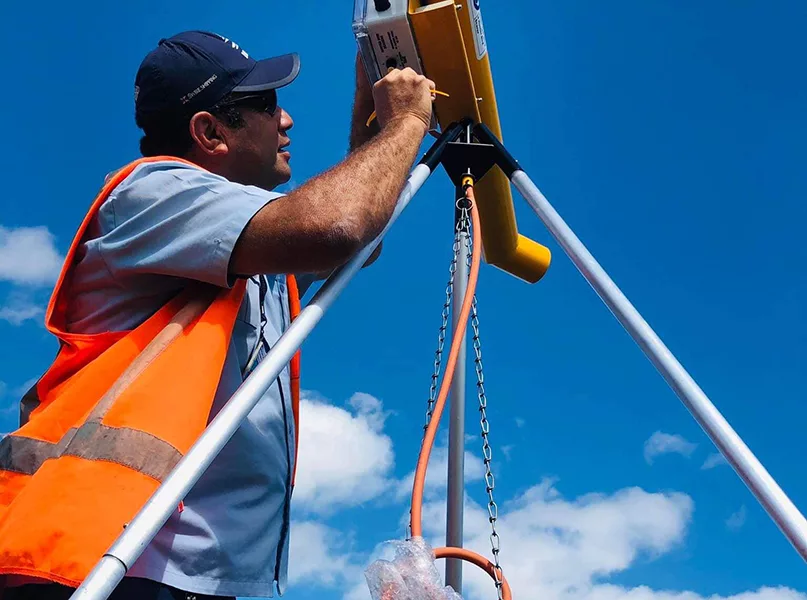
AIR TRAFFIC MANAGEMENT
As a wider branch of FA, the company provides reliable air traffic management (ATM) services within the Nadi Flight Information Region (Nadi FIR), which includes the sovereign airspaces of Tuvalu, New Caledonia, Kiribati Vanuatu, and Wallis and Futuna, covering a total of six million square kilometres (sqkm).
Commissioned in April 2021, its Aurora ATM System is one of the recent ventures for FA, as it expands its supply chain repertoire. The new Aurora ATM System consolidates an Oceanic, approach, and tower control capabilities, further supported by an automatic dependent surveillance-broadcast (ADS-B).
The system also showcases a brand-new air traffic control (ATC) simulator which ensures that the company’s staff base remain up to date with the latest training methodologies.
The Aurora ATM system integrates industry-leading procedural airspace management with the appropriate functionalities that are effectively used to manage air traffic in an ADS-B surveillance environment.
The system upgrade further modernises the ATM system by providing air traffic controllers with the latest state-of-the-art technology. As a result, they have access to electronic flight strips, advanced flight and surveillance data processing, and above-adequate training capabilities.
By utilising the system, optimal fuel efficiency is guaranteed in the procedural environment, further facilitating reduced separation minima that quantifies top airspace efficiency.
In October 2022, FA introduced surveillance control using ADS-B technology in the Fiji domestic airspace, becoming the first country in the world to transition from procedural control to surveillance control without the use of radar.
On top of this, the company’s recent innovations extend to the implementation of ICAO’s global reporting format (GRF) for both Nadi International Airport and Nausori International Airport in November 2021. This involved carefully detailed trials with FA’s partners, as well as precise documentation, equipment, and training required for staff to guarantee competency and regulatory compliance.
The upcoming projects in the ATM arm of the company include upgrades to the high-frequency radios, the Automatic Message Handling System (AMHS), the transition from aeronautical information services (AIS) to aeronautical information management (AIM), along with the introduction of remote tower technology and system-wide information management (SWIM).
FA is also seeking to break societal barriers within its ATM team regarding gender representation, with a 40 percent female workforce operating in a typically male-dominant work environment.
This positions the company at the forefront of the airspace management sector, in terms of the capability to manage mixed airspaces, ease of useability, and the overall capability to improve the efficiency of ATM.
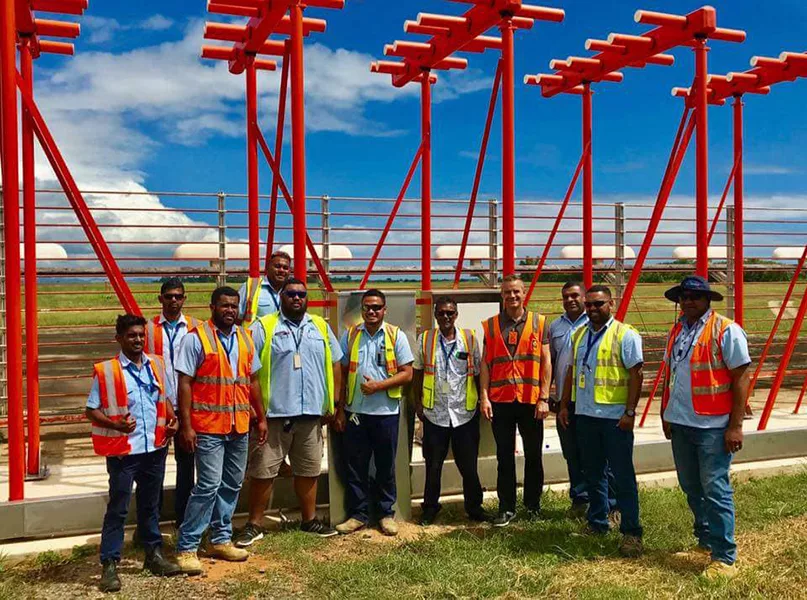
NEW HORIZONS
As FA continues on its burgeoning trajectory of growth, its senior leadership is going through a period of renewal, spearheaded by Nawari, who commenced the role in August this year.
Nawari holds an instinctive passion for the progression of the local area, having grown up in Nadi and attended the town’s local district school, subsequently studying at the Nadi Sangam (SKM) College, before pursuing higher studies in accounting and economics at the University of the South Pacific, Laucala Campus (USP). His education was then typified at the University of Sydney, Australia, studying finance, banking, and corporate governance.
Such a breadth of knowledge and experience is evidenced by the fact that at the age of 25, in 1996, Nawari was the youngest CEO in Fiji’s corporate sector, becoming a pioneer in a multitude of companies and having a magnanimous impact across many business fields.
Throughout his expansive career, Nawari has served as a Board Director and Trustee for a diverse variety of corporate bodies and financial institutions across the Asia Pacific region, including Fiji, Papua New Guinea (PNG), and China, amongst others.
Nawari strives to take FA forward as a transformational and strategic leader, who has had previous experience in establishing, rejuvenating, and leading a number of highly successful entities throughout Fiji.
Such businesses include Fiji Television Group Limited, Fijian Holdings Unit Trust, Unit Trust of Fiji, and South Pacific Stock Exchange.
With such a varied portfolio, the new CEO has a variety of expertise, with the capabilities to be a corporate, finance, and investment advisor, as well as a coach, trainer, and mentor in the areas of strategic finance, corporate governance, financial institutions development, investments, portfolio management, risk management, performance management, organisational re-engineering, and executive management development.
Regarding his previous roles, Nawari was the first CEO of the South Pacific Stick Exchange and the first General Manager of Fijian Holdings Unit Trust, two roles he is incredibly proud of.
Subsequently, Nawari was also the first CEO of Fiji TV Group, the holding organisation of Fiji TV, as well as Sky Pacific and EMTV in PNG. In these positions, he dramatically altered the South Pacific’s media landscape, implementing strategies that are still in place today.
To add to the trailblazing achievements, Nawari has also been involved in the education of the next generation of business leaders, enjoying the role of the first Deputy Head of the Graduate School of Business at the University of South Pacific (USP), and later becoming the first Corporate Specialist at the Pacific Islands Forum Secretariat.
Alongside current involvement as the acting Chairman of the Unit Trust (Management) Limited, Nawari greatly anticipates his new role as CEO, as he drives FA into the next phase of its evolution.
LUXURY EXPERIENCES
FA cares deeply about its passengers’ experiences at its airports; thus, it works closely with its stakeholders to ensure that each facility runs smooth and all its operations are streamlined, to uphold the company’s reputation for excellent service experience.
For the FA team, there is never a ‘business-as-usual day’, as they use world-class technology and processes to guarantee a seamless journey for their travellers.
The role of employees includes ensuring a top-notch, personalised experience for each passenger, facilitated by exceptional check-in experiences, efficient baggage handling, enhanced communication, detailed staff training, quick issue resolution, site-wide accessibility, safety and security, feedback collection, and sufficient technology integration.
Evidently, the tireless pursuit of quality is the very essence of FA’s ‘Bula’ spirit in serving its customers.
Such spirit is further endorsed by the luxury shopping experience provided at Nadi International Airport, which offers a world-class shopping and dining experience for international visitors.
Prouds and Tappoo are two major duty-free retailers available at the airport, showcasing designer products and prestigious brands, which meet every passenger’s indulgences.
GREENER AIRPORTS
As the international aviation industry shifts towards a sustainable future, FA puts environmentally-friendly operations at the forefront of its focus, particularly as its industry is one of the greatest contributors of greenhouse gas (GHG) emissions.
Thus, in an interconnected industry such as aviation, the company is proactively exploring collaboration and innovation to try and mitigate its detrimental impacts. To this end, FA aligns with the global industry’s goals to reduce carbon emissions and attain low-carbon status, transitioning to a fully-functioning, net zero airport.
Nadi International Airport, in particular, is ahead of the eco-friendly curve by earning Level 3 Optimisation accreditation, awarded due to the airport’s outstanding work in reducing its GHG emissions and engaging the airport’s stakeholders to also work towards a reduction.
Furthermore, the airport was highlighted amongst other airports in the Asia Pacific for its exceptional sustainable approach. Other awarded sites included Abu Dhabi International Airport and Dubai International Airport (UAE), Hamad International Airport (Qatar), Adelaide Airport (Australia), Hong Kong International Airport (Hong Kong), Incheon Airport (South Korea), and Narita International Airport (Japan).
To continue its renowned success, FA is in the initial process of constructing a solar farm at Nadi International Airport. This will have the impressive capability of fostering a 3.5 megawatt (MW) solar power system. In the second phase of the project, this capacity will be progressively increased to 8.5MW. Following this, solar power farms are also projected for Nausori International Airport and some of the outer island sites.
In conjuction with the implementation of solar power, the company is also looking to upgrade its halogen airfield lights to LEDs, whilst also introducing a comprehensive waste recycling system across all of its forecasted projects and operations.
As a government company, FA is also finalising the Fiji State Action Plan in partnership with the Ministry of Civil Aviation and Fiji Airways. This further demonstrates the organisation’s commitment to lowering the aviation industry’s carbon emissions in accordance with its obligations to ICAO.
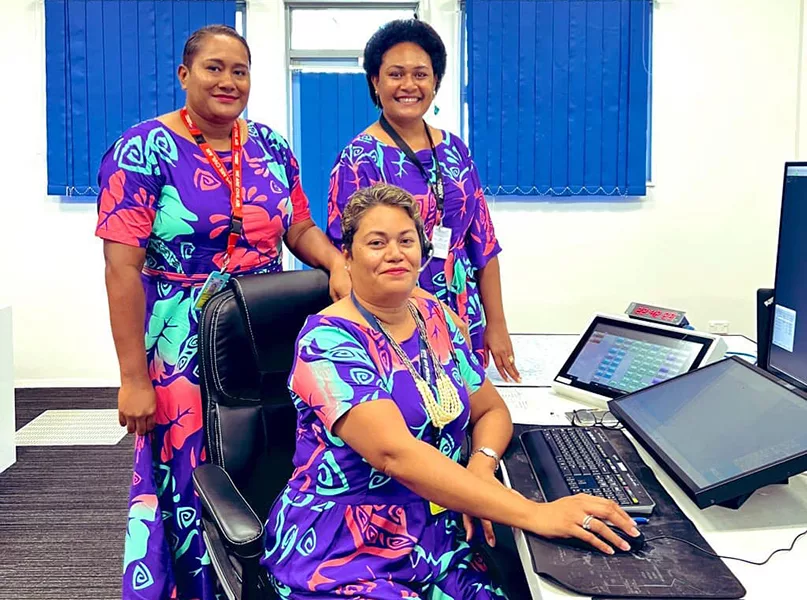
SAFETY AND SECURITY
Alongside its customer service and environmental initiatives, FA is also recognised for its diligent safety and security standards.
These measures have been implemented to ensure the welfare of everyone within an airport’s premises and are in accordance with ICAO standards.
Its airport safety and security protocols are purposefully designed to protect passengers, staff, and aircraft from potential dangers, including terror threats, criminal activity, and accidents.
Meanwhile, the company has also made major investments in its Aviation Rescue Fire Fighting Service (ARFFS), materialising in three new ARFFS vehicles, which will substantially improve the level of safety and preparedness in supporting aircraft operations at Nadi International Airport.
The first of its state-of-the-art Rosenbauer PANTHER 6×6 fire trucks fire will arrive at the end of this year, followed by a further two in July. FA will further invest in training and capacity building for its entire ARFFS team who will be in charge of its equipment across the company’s 15 airports.
The ARFFS system implemented by FA will have a substantial and meaningful impact on the airline as the airport’s safety is secured whilst the company continues its success in the coming decades.
As the company looks towards the Fijian aviation sector, it is well-positioned to play a vital role in contributing to the country’s economic growth. Internally, it endeavours to have a positive impact on its local community and support the growing population, whose livelihoods depend on the tourism and trade sectors.
Internationally, the company continues to rebound from the detriments caused by the global pandemic. Thus, FA is dedicated to the improvement of its internal infrastructure and enhancing its passenger experience to become industry-leaders. As a result, the company can further bolster the country’s global engagement and cement Fiji’s status as a global aviation hub.



